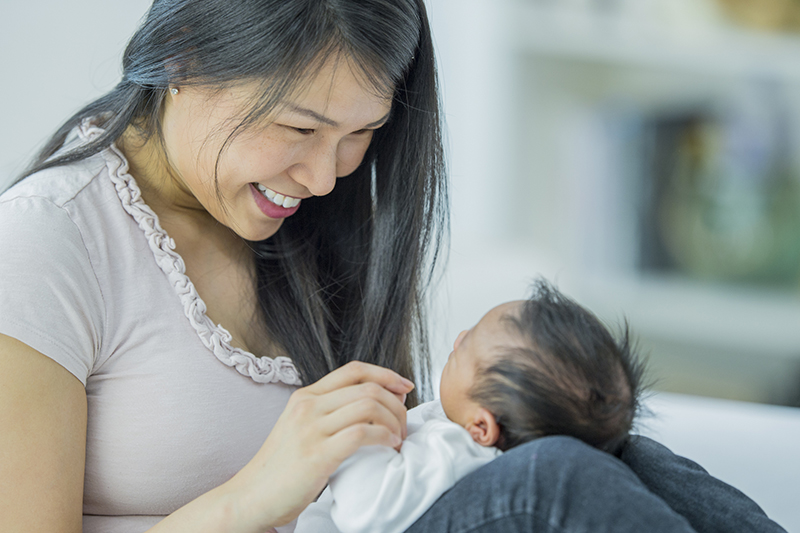Families For Life | Bonding with Your Newborn

Your baby’s brain has a lot of growing to do. You can help your baby’s brain development through bonding – lots of smiles, cuddles and loving words.
How bonding helps brain development
It’s no coincidence that brand-new humans are called ‘newborns’ instead of ‘just-borns’ or ‘recently-borns’. To these tiny humans, everything is new.
Although a newborn’s brain has about 100 million cells, the parts of the brain responsible for thinking, remembering and movement aren’t well developed. For example, newborns can’t figure out how to move their limbs to get more comfortable. They’re still not sure if they’re feeling hungry, tired, uncomfortable, ‘this-is-all-too-much’, or ‘I think I’m happy’.
Your newborn needs:
an established routine
a nurturing and soothing environment
lots of loving noises
plenty of physical affection.
Repeated human contact through touch, cuddling, talking, singing and facial expressions will help your baby’s brain to develop. These actions make the brain produce chemicals and hormones that make a baby grow emotionally and physically.
Emotional nourishment
Love actually makes a baby grow physically. This is because it causes the brain to produce chemicals that make the cells connect together and develop. In practical terms, you can make those connections happen by:
being physically affectionate
responding when your baby cries for you
making baby feel safe and secure.
Being physically affectionate
This can be holding, cuddling and rocking, talking, smiling and singing. Babies feel reassured and secure when held – they can identify the smell of mum, dad or whoever looks after them.
Babies particularly love warm skin-on-skin contact and soft reassuring stroking. Contact that is part of a baby’s routine (such as changing, washing and breastfeeding) is not only pleasurable for most newborns. It also makes a baby feel secure.
Responding to crying
Sometimes babies will cry because something is wrong – the diaper is wet, or they’re hungry, or the light is too bright. When you fix it, you make baby feel more comfortable and safe.
You might not be able to tell why baby’s crying. But by responding, you’re teaching baby to trust you – that you can be relied on. You can’t spoil your newborn.
Making baby feel safe
You can make your newborn feel safe and secure by providing good head and neck support when you’re holding your baby.
Also, wrapping your baby recreates the secure feeling of being in the womb. This can help babies stay calm when they’re starting to get fussy or need to go to sleep.
Our Step by Step in Pictures have illustrated ideas for giving your baby emotional nourishment.
Check our guides for bonding with your baby, holding your baby, wrapping your baby and understanding your baby's behaviour cues.
Mental stimulation
Your newborn’s world is much more about seeing, hearing and feeling than it is about thinking. Providing sensory experiences for your newborn’s eyes, ears and skin puts baby’s brain to work and makes it grow. This in turn helps the parts of the brain responsible for memory, thought and language to connect and develop.
Try the following ideas to give your newborn mental stimulation:
Talk to your baby as often as you can in soothing, reassuring tones. This will help baby to identify your voice and teach baby the basics of language. It might feel silly talking to someone who can’t talk back. But it’s important to know that babies learn to recognise sounds and voices they hear often.
Tell baby stories or sing songs. This has the same effect as talking. Also, babies at this age are most attracted to pitch and rhythm and can enjoy the sounds of soothing music.
While you talk and sing, look your baby in the eye and make facial expressions. This will help baby learn the connection between words and feelings.
Regularly touch and cuddle your newborn. Your newborn can feel even the gentlest touch from the moment of birth. This will make baby feel safe and secure. Newborn brains know they’re being touched too. Touch sparks the brain to produce chemicals that make your baby feel good.
Video: "Growing with your Child" Birth to 6 months
In this video, learn tips on bonding and your baby's development.
© raisingchildren.net.au, translated and adapted with permission
Explore more